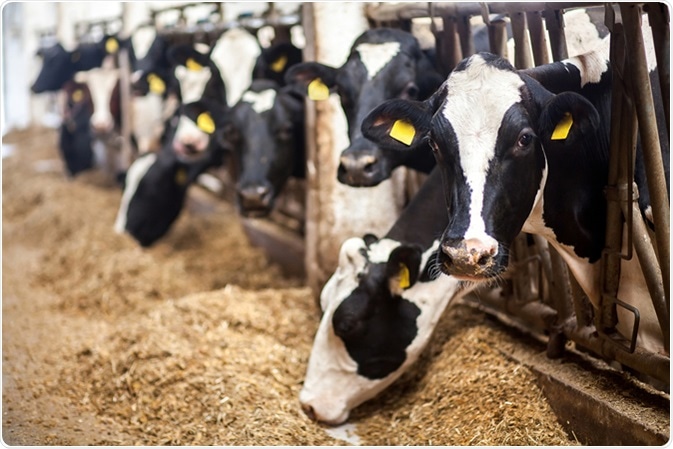The presence of hormones in milk and dairy foods has been discussed for decades. In recent years, consumers have become increasingly proactive in investigating the relationship between diet and health, and awareness of issues concerning food production has increased significantly.
In the Western diet, milk and other dairy products such as cheese, butter and yoghurt are very common, and their importance is increasing in Asia.
The hormones found in dairy foods, while naturally occurring, do have biological effects in both humans and animals. As sex hormones are part of animal metabolism, any product deriving from an animal source will contain these hormones. The effects from consuming these hormones can range from growth promotion related to sex steroids to carcinogenic effects.

Dairy cows. Image Credit: Studio Peace / Shutterstock
Why are Hormones Found in Food?
Hormones are used for a number of reasons in animal-based food production. Some such reasons are:
- Young animals gain weight faster
- Reduced waiting time
- Reduction in the average amount of feed required by an animal
- Increased milk production
- Increased overall efficiency and profitability of meat and dairy industries.
In the US, there are six different kinds of hormones approved by the Food and Drug Administration (FDA) for use in food production. These include the naturally occurring female sex hormones estradiol and progesterone, natural male sex hormone testosterone, and three man-made chemicals zeranol, trenbolone acetate and melengesterol acetate.
Estrogen in Meat, Dairy, and Eggs
Sex Hormones Found in Milk
It is currently believed that the majority of hormones found in milk are transferred by diffusion. The most important hormones found in milk and other dairy products include:
- Prolactin
- Estrogen
- Progesterone
- Corticoids
- Androgens
Recombinant bovine growth hormone (rBGH), which is a synthetic cow hormone that encourages milk production, has no detectable effect on humans. However, manipulating growth hormones in this way may actually increase the production of other hormones such as insulin-like growth factor-1 (IGF-1).
Insulin-like growth factor-1 is a 70-amino acid polypeptide. Chiefly, it is produced by the mammary glands and the liver, but there is no tissue that fails to synthesize it. IGF-1’s anabolic signals have been linked to the development of tumors through anti-apoptosis effects and by stimulating cell proliferation.
High levels of IGF-1 have been associated with increased risk of cancer of the colon, pancreas, endometrium and breast and prostate in particular. It is important to note that a high level of IGF can increase the risk of these cancers regardless of its source.
Estrogen and progesterone in women and testosterone in men are the most important endogenous sex hormones.
Estrogen and progesterone are both found in cow’s milk, and levels of both estrogen and progesterone are higher in cows in commercial dairy production, as they are often pregnant shortly after giving birth to a calf. Consequently, the milk they produce thereafter may contain significantly higher levels of estrogen and progesterone.
Sex Hormones in Meat Products
Growth hormones are a central part of meat production. They are used to control growth, the amount of feed an animal requires, an animal’s milk production, as well as the production of fat and muscle. Treating animals with hormones can increase the worth of the meat and make animals cheaper to raise.
Exogenous Sex Hormones
Exogenous sex hormones are chemicals that are manufactured to mimic the functions of the naturally occurring sex hormones. They can be used to encourage ovulation to help a person to become pregnant. Some exogenous hormones have been found to be carcinogenic to humans, and as such their presence in food is strictly controlled or, in some cases, prohibited entirely. For instance, milk from cows that have been recently injected with exogenous hormones cannot be used for commercial purposes.
What are the Risks of Sex Hormones in Meat and Dairy Products?
In 1960, a synthetic estrogen drug called diethylstillbestrol (DES), that was used to prevent miscarriages, was found to increase the risk of vaginal cancer in the daughters of treated women, and was then banned from use. A lifetime of exposure to estrogen has been associated with an increased risk of breast cancer.
Growth hormones found in meat could have a substantial effect on prepubescent children. If a child isn’t yet producing growth hormones themselves, consumption of these growth hormones through either meat or dairy products could enter the child into puberty around seven months earlier, a study has found. However, there isn’t a definitive link to prove this as early puberty is also attributed to a number of other reasons, ranging from obesity and lack of exercise, to the consumption of a lot of processed food.
Summary
There is no definitive proof that sex and growth hormones found in meat and dairy products will lead to cancer, or cause early puberty in children.
Ambiguity comes from the fact that many of the hormones found in these products are naturally occurring both in the animal and the human consumer, and it is difficult to differentiate between synthetic hormones and naturally occurring hormones in meat or dairy samples.
Furthermore, the effects of consuming growth and sex hormones through meat and dairy products can be subtle and take a long time to present themselves.
The amount of hormones that enter a person’s bloodstream is also very small compared to the amount of hormones a person would be producing naturally on a daily basis. However, the EU has banned all hormones in beef and rBGH has been banned in Japan, Canada, Australia and New Zealand.
Further Reading
Last Updated: Dec 5, 2022